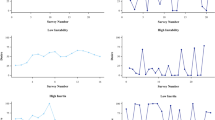Abstract
This paper integrates the meanings created about menopause through a biopsychosocial perpective. Once understood only as a biological illness creating affective disorders, new paradigms provide understanding based on the psychological and social constructions of the process. History emphasizes a view of women experiencing increasing deficiency and loss, while modern interpretations view women as gaining new freedoms. Case material is presented to direct attention to the meanings of menopause as it emerges in the treatment process.
Similar content being viewed by others
REFERENCES
Benedek, T. (1973). Psychoanalytic investigations: Selected papers. (pp. 322-349). New York: Quadrangle/N.Y. Times Book Co.
Bowles, C. (1990). The menopausal experience: Sociocultural influences and theoretical models. In R. Formanek (Ed.), The meanings of menopause. New Jersey: Analytic Press.
Brody, J. (1997). Drug researchers working to design customized estrogen. Science Times: The New York Times. 3/4, B9.
Deutsch, H. (1925). Psychoanalysis of the sexual functions of women. International Journal of Psychoanalysis, Vol. 6.
— (1984). The menopause. International Journal of Psychoanalysis, 65, 55-61.
— (1945). The climacterium. The psychology of women: psychoanalytic interpretation: motherhood, II (pp. 456-491). New York: Grune and Stratton.
Dickson, G. L. (1990). A feminist poststructuralist analysis of the knowledge of menopause. Advances in Nursing Science, 12, 15-30.
Erikson, E. (1963). Childhood and society. New York: W.W. Norton and Co., Inc.
Formanek, R. (1990). Continuity and change and the “change of life” Premodern views of the menopause. In R. Formanek (Ed.), The meanings of menopause. New Jersey: Analytic Press.
Gannon, L. (1990). Endocrinology of menopause. In R. Formanek (Ed.), The meanings of menopause. New Jersey: Analytic Press.
Germain, C. (1991). Human behavior in the social environment. New York: Columbia Press.
Greene, J.G. (1990). Psychosocial influences and life events at the time of menopause. In R. Formanek (Ed.), The meanings of menopause. Hillsdale, New Jersey: Analytic Press.
Harris, H. (1990). A critical view of three psychoanalytic positions on menopause, In R. Formanek (Ed.), The meanings of menopause. New Jersey: Analytic Press.
Hunter, K. (1991). Doctor's stories. New Jersey: Princeton.
Kaufert, P.A. (1982). Myth and menopause. Sociology of Health and Illness, 4, 141-166.
Lang, J. A. (1984). Notes toward a psychology of the feminine self. In P. Stepansky and A. Goldberg (Eds.), Kohut's legacy contributions to self psychology. New Jersey: Analytic Press.
Lax, R. (1982). The expectable depressive climacteric reaction. Bulletin of the Meninger Clinic, 46(2), 151-167.
McAdams, D. (1993). The stories we live by. New York: Guilford.
McQuaide, S. (1998). Opening spaces for alternative images and narratives of midlife women. Clinical Social Work Journal, 26(1), 39-54.
Neugarten, B. (1976). Middle age and aging. Chicago: University of Chicago Press.
Rubin, L. B. (1979). Women of a certain age: The midlife search for self. New York: Harper and Row.
Saari, C. (1991). The creation of meanings in clinical social work. New York: Guilford.
Scarf, M. (1980). Unfinished business: pressure points in the lives of women. Garden City, New York: Doubleday.
Sheehy, G. (1991). The silent passage. New York: Pocket Books.
Author information
Authors and Affiliations
Rights and permissions
About this article
Cite this article
Spira, M., Berger, B. The Evolution of Understanding Menopause in Clinical Treatment. Clinical Social Work Journal 27, 259–273 (1999). https://doi.org/10.1023/A:1022890219316
Issue Date:
DOI: https://doi.org/10.1023/A:1022890219316




